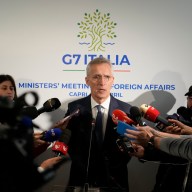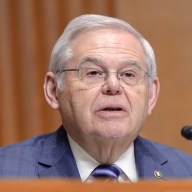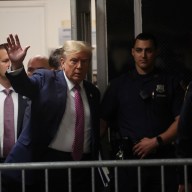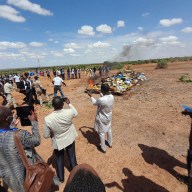Sam Childers has had quite the unique life, going from a drug addict, convict and to a man of God who works tirelessly to rescue orphans in war-torn countries around the world.
Dubbed the Machine Gun Preacher for his faith in both scripture and firearms while building orphanages in Sudan over the past decade, Childers has been met with a surprising amount of resistance to his work. But resistance, he says, he can handle. How about the glare of the Hollywood spotlight? He now finds himself being portrayed by Gerard Butler on the big screen; his past deeds, both good and bad, out for the world to see — and some of them, he tells Metro, never even happened.
Where did the nickname come from?
It started inside of Sudan when I first got there. When I started building the orphanage in 2000,
I slept on a grass mat, and a lot of the village people would see me with a machine gun on one side
and a bible on the other side, so they started saying, “This man is a preacher! But he has a machine gun!” So they started calling me the Machine Gun Preacher. Here in the U.S. there were a couple of
stories titled Machine Gun Preacher trying to discredit me. The first time I read one I was kind of worked up, and God said, “Claim that name.” It gets people’s attention.
Did you have much say over what parts of your life ended up on screen?
No, not really. To be honest with you, they didn’t use the most violent parts of my life. If they were going to really cover my life, they would’ve had to make a series. There’s no way it could be done in one movie. And I hear there’s even talk of doing some other stuff, too. Maybe they will. It’s all in God’s hands.
Do you take issue with anything presented in the film?
There was a few things that I did not do in that movie. There’s a few things that might have been amped up in the movie, like the action scenes, but there’s enough good that I’m satisfied. The one part in the movie where it had me robbing a drug dealer and saying a bad word to him because he’s a black man — I’ve never done that before. Have I robbed drug dealers? A lot of them. But I’ve never used that kind of language. My dad’s mother died when he was five years old, and he was raised by a black lady. So I grew up respecting people for who they are. I grew up not looking at colour.
Were you surprised by the resistance your work has been met with?
You’ll be surprised. There’s a lot of people that [don’t agree with me]. I had a reporter yesterday totally against guns, and I asked him, “Well, your mother is across the street, she’s been raped by rebels. You have a gun right here. What would you do?” And he says, “I don’t know, I have to think about it.” I said, “You don’t love your mother.” Bottom line. How can we say we have to think about it if it’s our mother, our brother or our sister or a child getting raped by rebels? Why do you got to think?
Why do you think other countries have been getting more attention than Sudan?
You know, maybe it was just their season. Maybe it was just their time to get it. And I believe that, along with this movie and a lot of other people that are going to be speaking out, I believe that Sudan is going to get that attention now. I believe that this movie is not about Sam Childers. I believe that this movie is literally going to change a nation. South Sudan is doing a wonderful job of building their infrastructure, but Northern Sudan is still giving problems. All of these little rebel groups are all being fueled and financed by the president of Northern Sudan, Omar al-Bashir. In Darfur, there’s over 6,000 children dying per month, and that’s from war crimes, starvation, disease and stuff like that. So there’s a serious problem. Our only hope is that this man will be taken out of office.















